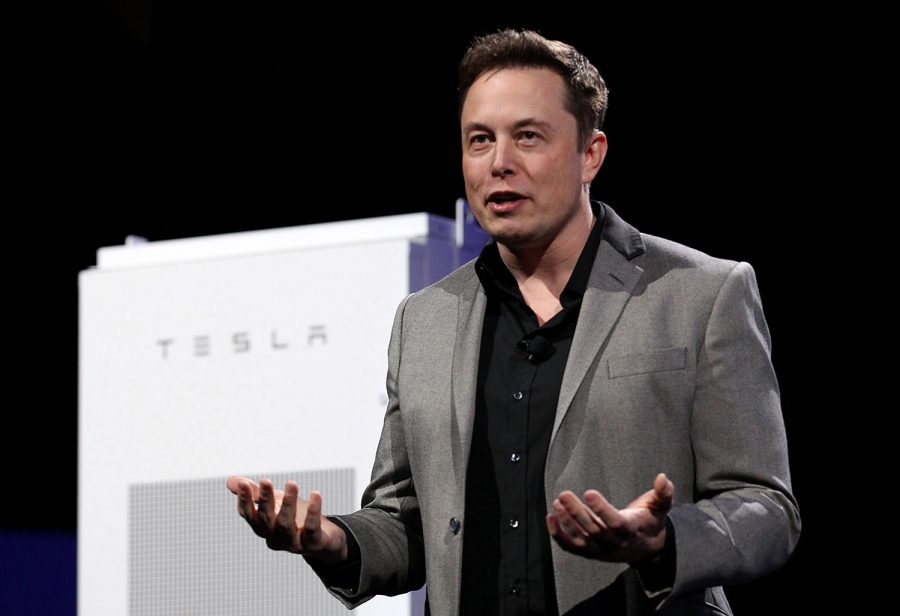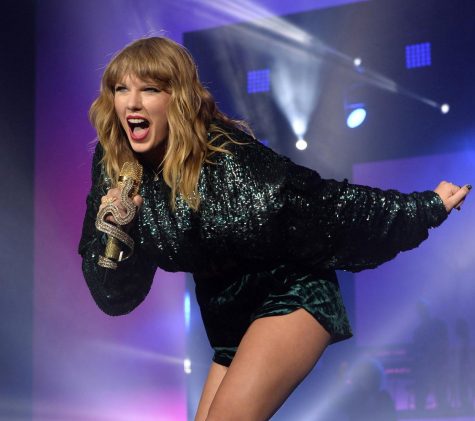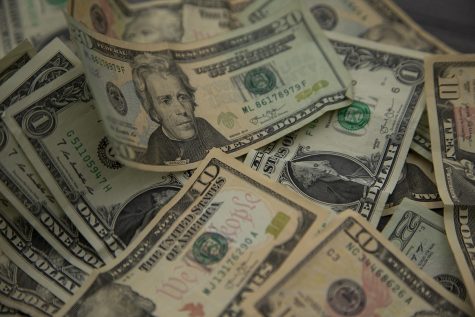Laursen: Tesla won’t stand the test of time
Tesla’s stock is most vulnerable to the condition of its innovator, Elon Musk.
Tesla CEO Elon Musk on April 30, 2015 during an event at Tesla’s plant in Hawthorne, California. (Luis Sinco/Los Angeles Times/TNS)
October 15, 2018
Over the past few weeks, Tesla’s stock has ridden a $60 plus range. For a stockholder, that is a pretty turbulent ride. And though many still believe in Elon Musk and Tesla, the stock’s erratic behavior spells trouble for stockholders.
Stock prices are factored on a number of different things. Most people know that a company’s stock price is a reflection of a company’s value. But what does value really mean?
To people in the finance world, value is a calculable number. It can come from a whole slew of different ratios — in other words, value is finite. But to the average stockholder, value can come from something else — something that is anything but calculable, a brand’s worth.
For example, at the end of August and early into September, Apple’s stock rose. This was in part caused by the anticipated release of its newest iPhone and iWatch, which became available Sept. 21. As initial reports of the iPhone XS and XS Max noted that there may be issues with the new product, Apple’s stock price hit a snag, too. Basically, public perception influences just how much people value a brand, which in turn affects stock prices.
The product and sales are not the only thing that people buy into. Stockholders can and do consider who is running the company or even which companies are most likely to have the next big idea. This is precisely what a company such as Tesla relies on.
Upon a relatively simple investigation of the numbers, Tesla doesn’t seem to be doing that well. The last two quarters Tesla posted losses, and its bonds are rated B-minus by S&P Global. For those who are not familiar with bond ratings, B-minus is considered “junk” to financial analysts. All of this means, Tesla is not likely to pay back the money the debt it owes to investors.
If investors are not paid back, a company defaults and typically files for bankruptcy. This means, stockholders don’t see a penny back on the money they used to purchase their stocks. What a bummer.
RELATED: New student organization wants more women in business
With these abysmal financial records, how is Tesla still selling close to $275 a share, you may ask. To put it shortly, people believe in Musk. Young and old people alike realize that the individual-transportation industry must change, and Musk seems to be the only major innovator who is up for the task.
He has done an incredible job of branding himself as a humanitarian. He is a part of The Giving Pledge, which is a promise to spend most of his wealth on philanthropic endeavors instead of keeping the money for themselves and beneficiaries. Musk has followed through on his word; he funded international education efforts, and he donated materials to help victims of the hurricane that devastated Puerto Rico.
But just as Musk’s reputation has inflated the evaluation of Tesla, his recent battle with the SEC has caused stock prices to plummet. When Musk is plagued with negative press, it seems Tesla’s stock price is destined to fall.
Stockholders should be cautious when choosing to invest their money in Tesla. Yes, Musk seems like a great guy. I have no doubt in my mind whether Musk will continue to be on the forefront of innovations in our society. What is less certain is if Tesla will be there to see it.
RELATED: UI freshman makes thousands in stock market trade out of his dorm room



















